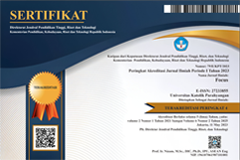Youth Interfaith Dialogue in Everyday Citizenship in Indonesia: Bridging Religious Diversity and Citizenship Challenges
DOI:
https://doi.org/10.26593/focus.v4i2.7375Keywords:
Interfaith Dialogue, Youth Engagement Citizenship, Challenges Religious DiversityAbstract
This research explores the role of interfaith dialogue among Indonesian youth in fostering everyday citizenship, particularly within the context of religious diversity. The study draws on the dynamics of interfaith engagement, emphasizing its significance in promoting social cohesion, peace, and civic participation. The framework integrates the "Seven Moments of Inter-religious Dialogue" proposed by J.B. Banawiratma and Stokke's (2017) dimensions of citizenship, including membership, legal status, rights, and participation. Examining the Abrahamic religions context, the research delves into historical challenges and the potential for dialogue to overcome intergenerational religious biases. The study highlights the necessity of understanding religious pluralism and building bridges among communities, particularly within the Muslim-Christian-Jewish framework. In the Indonesian youth context, the research identifies various interfaith dialogue initiatives undertaken by youth organizations across regions. It explores how these initiatives contribute to societal harmony, reduce radicalization, and empower civil society. The research also addresses challenges such as power dynamics and leadership influence in maintaining peace, emphasizing the grassroots' role. Moving beyond religious discourse, the study analyzes the intersection of interfaith dialogue with everyday citizenship issues in Indonesia. It investigates how dialogue addresses challenges related to LGBTQ+ rights, indigenous religious rights, and interreligious marriage. The research argues that interfaith dialogue plays a pivotal role in acknowledging inclusive citizenship, facilitating coexistence, and addressing complex societal issues. The findings suggest that interfaith dialogue not only promotes religious understanding but also enhances civic engagement, contributing to social justice and peace. The research concludes with insights into the potential of interfaith dialogue to bridge gaps between diverse religious and non-religious perspectives, fostering a more inclusive and tolerant citizenship in Indonesia.
References
Aafreedi, N. J. (2020). Peacebuilding. Interreligious Studies: Dispatches from an Emerging Field. Baylor University.
Abu-Nimer, M., & Smith, R. K. (2016). Interreligious and intercultural education for dialogue, peace and social cohesion. International Review of Education, 62, 393–405.
Amran, A. (2020). Implementation of education for sustainable development to enhance Indonesian golden generation character. In Journal of Physics: Conference Series (Vol. 1521, Issue 4). https://doi.org/10.1088/1742-6596/1521/4/042102
Banawiratma, J. B. (2010). Dialog antarumat beragama: gagasan dan praktik di Indonesia. Kerja Sama Penerbit Mizan Publika Dengan Program Studi Agama Dan Lintas ….
Bourdieu, P. (1977). Outline of A Theory of Practice. Cambridge University Press.
Corrigan, J. (2015). Emptiness: Feeling Christian in America. University of Chicago Press.
Coser, L. (1956). The Function of Social Conflict. The Free Press.
Hefner, R. W. (2018). Routledge handbook of contemporary Indonesia. Routledge.
Hewer, C. (2008). Theological Issues in Christian‐Muslim Dialogue. New Blackfriars, 89(1021), 311–323.
Husein, F. (2019). Youth Expressions of Religiosity Through Dialogue in Indonesia. International Journal of Interreligious and Intercultural Studies, 2(2), 1–17.
Isin, E. F. T., & S, B. (2002). Citizenship Studies: An Introduction. Handbook of Citizenship Studies. SAGE Publications Ltd.
Maxwell, J. A. (2008). Designing a qualitative study. The SAGE Handbook of Applied Social Research Methods, 2, 214–253.
McGarvey, K. (2019). Interreligious Dialogue and Muslim Migration to Europe. The Furrow, 70(2), 82–90.
Merrigan, T. (2017). Introduction: Rethinking Theologies of Interreligious Dialogue. The Past, Present, and Future of Theologies of Interreligious Dialogue, UK. Oxford University Press.
Moses, P. (2009). The saint and the sultan: the Crusades, Islam, and Francis of Assisi’s mission of peace. Image.
Pratt, D. (2021). Contemporary Christian-Muslim Dialogue: Two Twenty-first Century Initiatives. Routledge.
R, D. C. (2016). Coexistence not Reconciliation: From Communal Violence to Non-Violence in North Maluku, Eastern Indonesia. The Asia Pacific Journal of Anthropology, 17(5), 460–474.
Rakhmawati, N. (2010). Interfaith Dialogue in Indonesia’s Public Diplomacy. Global: Jurnal Politik Internasional, 10(1), 58–74.
Scheffler, T. (2007). Interreligious Dialogue and Peacebuilding. Die Friedens-Warte, 82(2/3), 173–187.
See, G. K. (2005). Muslim-Christian Dialogue: Signs of Hope. European Judaism: A Journal for New Europe, 38(1), 48–61.
Setia, P., & Haq, M. Z. (2023). Countering Radicalism in Social Media by Campaigning for Religious Moderation. Focus, 4(1), 13–24.
Siahaya, J. R., Siddiq, Y. M., Murdo, A., Nafi, I. T., & Muhammad. (2023). Interfaith Dialogue in The Context of Globalization: The Role of Religion in International Diplomacy. International Journal of Science and Society, 5(4), 851–864.
Smock, D. (2003). Building Interreligious Trust in a Climate of Fear: An Abrahamic Trialogue. US Institute of Peace.
Spalek, B., & Lambert, R. (2008). Muslim communities, counter-terrorism and counter-radicalisation: A critically reflective approach to engagement. International Journal of Law, Crime and Justice, 36(4), 257–270. https://doi.org/10.1016/j.ijlcj.2008.08.004
Stokke, K. (2017). Politics of Citizenship: Towards an Analytical Framework. Norsk Geografisk Tidsskrift - Norwegian Journal of Geography, 71(4), 193–207.

Downloads
Published
Issue
Section
License
Copyright (c) 2023 Anisa Eka Putri Kusmayani

This work is licensed under a Creative Commons Attribution-ShareAlike 4.0 International License.



















